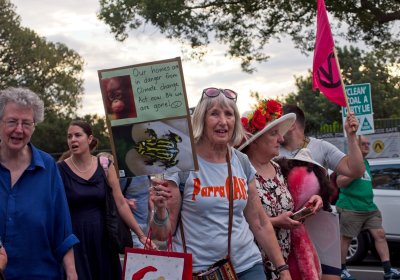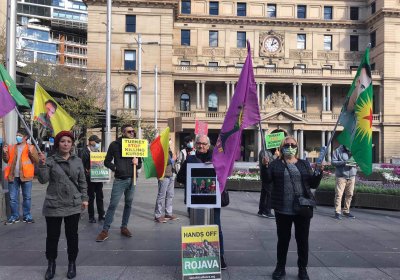Ecosocialists and ecoanarchists share an anti-capitalist stance, both viewing capitalism as the root of numerous social and environmental problems, writes Hans Baer.
Rojava revolution
Supporters of the Rojava Revoluton in north and east Syria will commemorate the seventh anniversary of World Kobane Day on November 1, writes Peter Boyle.
Rojava Solidarity Sydney organised a rally to commemorate the 8th anniversary of the Rojava Revolution, reports Peter Boyle.
Some have argued that although abolishing the police is the best option, such a scenario is not viable. Yet such a scenario already exists in Rojava, writes Hawzhin Azeez.
Green Left’s Peter Boyle spoke to Salih Muslim, of the Democratic Union Party in north and east Syria, about the threat COVID-19 poses throughout the region.
Peter Boyle reports from Brussels that European left and green parliamentarians condemned Turkey's invasion of Rojava, the democratic autonomous liberated zone in North and East Syria, at an international conference on February 5–6.
Ecology — together with democratic confederalism and women’s liberation — is an essential pillar of the Rojava Revolution. What is happening in Rojava is about more than just protecting nature by limiting damage to it; it is about reestablishing the balance between people and nature.
The Bashir al Assad regime has made little progress in its attempt to recapture rebel-held territory in northwestern Syria. Rebels continue to control most of Idlib and parts of adjacent provinces, writes Chris Slee.
Since the liberation of the last of the ISIS-occupied territory this year, the self-administered areas of northern and eastern Syria set up by the liberation forces have enjoyed secure and stable conditions. However, they have been denied representation in the international negotiations to resolve the Syrian crisis, write Ismet Tashtan and Peter Boyle.
Make Rojava Green Again is an ecological campaign comprising activists from around the world, inspired by the ecological, feminist, multi-ethnic and democratic revolution taking place in Rojava in Northern Syria.
The Assad regime and its allies have been building up their forces around the rebel-held Idlib province, in Syria’s north-west, in preparation for a major offensive. Some bombing raids have already been carried out in the south and west of the province.
The Kurdistan Communities Union (KCK) is an umbrella group of left-wing organisations in Turkey, Syria, Iraq and Iran that adhere to the ideology of Kurdish revolutionary leader Abdullah Ocalan (known as “Apo”), currently in jail in Turkey. Forces associated with the KCK have helped lead the Rojava Revolution in Syria’s north, which marked its sixth anniversary on July 19, the day Kurdish-led forces staged an insurrection.
- Previous page
- Page 3
- Next page










